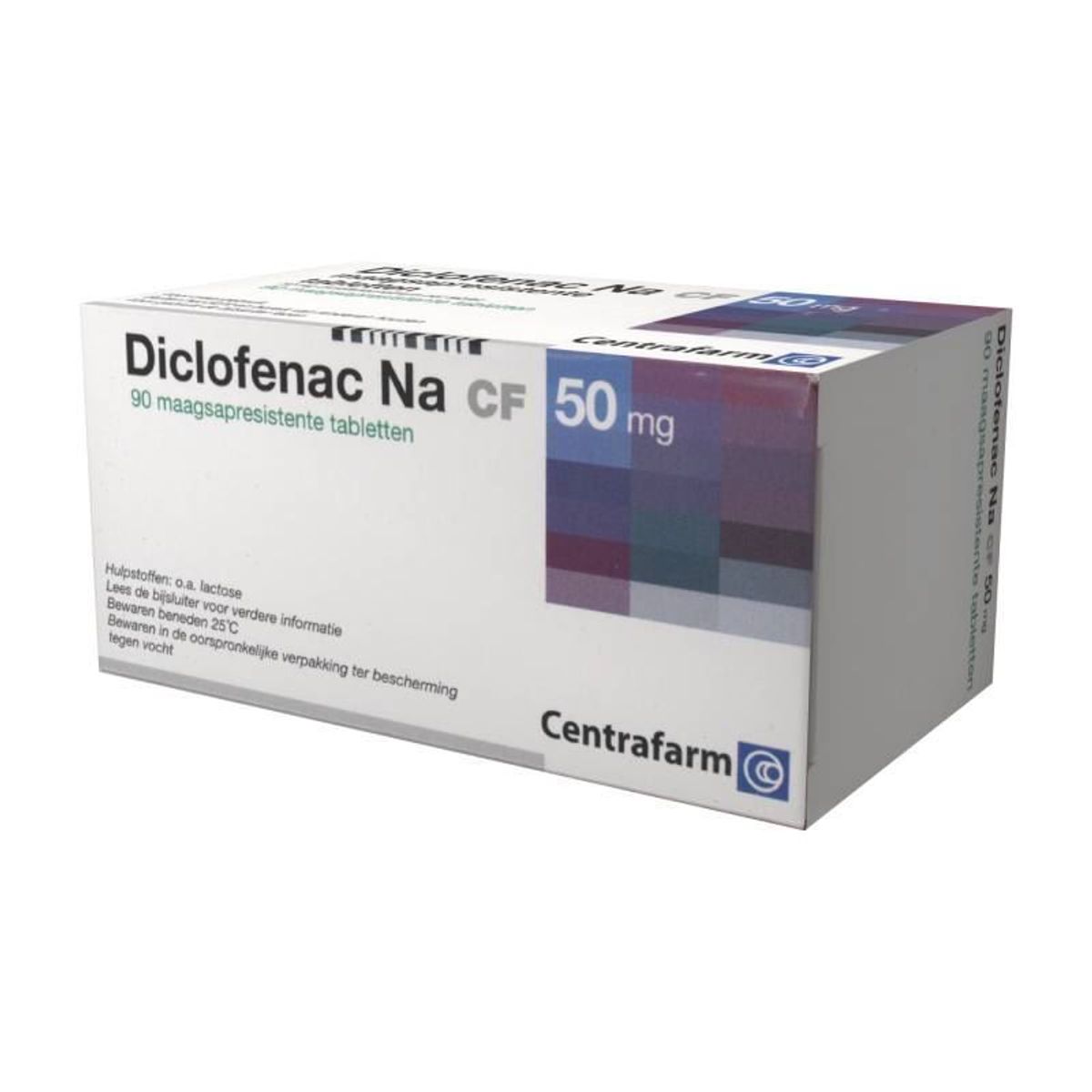
Diclofenac
- Non-steroidal anti-inflammatory drug (NSAID)
- For joint problems
- Also used for heavy menstrual bleeding
- Tablets for oral use
- This medicine is a prescription-only medicine. Add the product to your shopping cart to start an (online) consultation.
About Diclofenac
Joint pain is a symptom that many women experience when they go through menopause. Intense period pain is also commonly reported. Do you suffer these symptoms and are they severe? Then a doctor may prescribe an anti-inflammatory painkiller, such as Diclofenac. This medicine not only alleviates the pain, but also reduces inflammation in the joints. This in turn helps reduce symptoms such as swelling and redness.
Note: This painkiller should not be used for an extended period of time. If you are over 65 years of age, the doctor may start you on a lower dose.
How to use Diclofenac
Diclofenac is available in various forms, including gastro-resistant tablets and delayed release tablets. The doctor will recommend the right variant for you depending on your symptoms.
Swallow the tablets whole with a drink of water, without chewing. Take the tablets with food. You should take the lowest effective dose of Diclofenac for the shortest possible time.
Dosage
Dosage varies per person and is determined by a doctor for each specific patient depending on the symptoms. The general dosage guidelines are listed below.
Adults (18 years and above):
- For rheumatic joint pain (arthritis): the starting dose is 150 mg a day, the maintenance dose for long-term treatment is 75-100 mg.
- For joint wear (arthrosis): the starting dose is 100-150 mg a day, depending on the severity of the pain. The maintenance dose for long-term treatment is 75-100 mg.
- For frozen shoulder, painful inflammation and swelling, for example after a dental procedure or surgery: the starting dose is 150 mg a day, depending on the severity of the pain.
- For menstrual pain: dosage is determined by a doctor and typically varies between 50‑150 mg a day. The starting dose is 50-100 mg. A doctor may increase this dose to a maximum daily dose of 200 mg if needed.
- Illness accompanied by fever: 0.5-1 mg per kg body weight a day.
The daily dose is usually divided in two or three doses. Diclofenac is not suitable for use in children. For people aged 65 and above, the appropriate dose is determined by a doctor.
See the package leaflet for more information.
Alcohol/driving
This medicine does not interact with alcohol. Very occasionally people have reported that Diclofenac tablets have made them dizzy. If you are affected in this way, you should not drive or operate machinery.
If you use more/forget to use Diclofenac
If you take more Diclofenac tablets than you were told to, consult your doctor or pharmacist.
If you forget to take a dose, take one as soon as you remember unless it is almost time for your next dose. Do not take a double dose to make up for the forgotten one.
When not to use Diclofenac
Diclofenac is not suitable for everyone. Do not use this medicine if:
- You are allergic to the active substance diclofenac or any other ingredient in this medicine (see section 'What Diclofenac contains').
- You have, or have had, a stomach (gastric) or duodenal (peptic) ulcer. This may have been when you used an NSAID before.
- You have any sign of bleeding in your stomach or intestine, for example, when emptying your bowels (black tarry faeces).
- You have severe liver or kidney problems.
- You are in the last three months of pregnancy.
- You have ever had an allergic reaction after taking NSAIDs. Reactions may include asthma, wheezing, itchy skin rash (hives), hay fever symptoms such as runny nose.
- You currently have any bleeding or bleeding problems.
- You have an abnormal blood count (blood dyscrasia).
- You have blood count problems, e.g., reduced numbers of white blood cells, blood palates or red blood cells.
- You have established heart disease and/or cerebrovascular disease, e.g., if you have had a heart attack, stroke, mini-stroke (TIA) or blockages in blood vessels to the heart or brain or an operation to clear or bypass blockages.
- You have, or have had, problems with your blood circulation (peripheral arterial disease).
When should this medicine be used with caution?
In some cases, special care should be taken with this medicine. For instance, if:
- You have ever had gastrointestinal problems after taking NSAIDs in the past.
- You have asthma, seasonal hay fever or other chronic respiratory tract problems, such as nasal polyps (growths in the nasal lining) or chronic obstructive pulmonary disease (COPD).
- You are prone to allergic reactions such as skin rash, itching or nettle rash.
- You have an inflammatory bowel disease, such as Crohn’s disease or ulcerative colitis.
- You have a bleeding disorder or other blood disorders, including a rare liver condition called hepatic porphyria.
- You have Lupus (SLE) or any similar condition, or a chronic inflammatory condition.
- You smoke.
- You have diabetes.
- You have angina, blood clots, high blood pressure, raised cholesterol or raised triglycerides.
- You have liver or kidney problems.
- You are at risk of being dehydrated (e.g., by sickness, diarrhoea, or before or after major surgery).
- You have a viral infection caused by the herpes varicella zoster virus.
For a complete list of warnings, see the package leaflet. Always consult a doctor if an above-listed condition or situation applies to you.
Pregnancy and breastfeeding
Do not use Diclofenac you are pregnant, planning to conceive or breastfeeding.
Other medicines and Diclofenac
Tell your doctor if you are taking, have recently taken or might take any other medicines. This includes medicines obtained without a prescription and herbal medicines.
If you are taking any of the following medicines alongside Diclofenac you may be more prone to gastrointestinal bleeding or ulcers.
- Oral corticosteroids.
- Anti-coagulants ('blood thinners').
- SSRI antidepressants (selective serotonin reuptake inhibitors).
- Other NSAIDs such as aspirin (also known as acetylsalicylic acid) or ibuprofen. All anti-inflammatory pain relievers, including diclofenac, can cause side effects such as bleeding in the stomach or intestine, or stomach or peptic ulcers (see the package leaflet for more information).
For a list of all medicines that may interfere with the way Diclofenac works, see the package leaflet. Your doctor will have a list of medicines that you should avoid mixing Diclofenac with.
Side effects
Medicines can cause side effects, although some people may not experience any. Side effects that are known to be associated with Diclofenac include:
Common (may affect up to 1 in 10 people):
- Headache, dizziness.
- Gastrointestinal problems.
- Liver function disorders.
- Skin rash.
- Dizziness.
Rare (may affect up to 1 in 1,000 people):
- Drowsiness.
- Abdominal pain.
- Itchy skin rash.
- Swelling of arms, hands, legs and feet (oedema).
For a list of very rare side effects, please see the package leaflet. Some side effects can be serious. Go to the emergency department at your nearest hospital to seek medical help immediately if
you notice signs of a severe allergic reaction, stroke, meningitis or stomach bleeding.
If you get any side effects, talk to your doctor. This includes any possible side effects not listed in this leaflet.
What Diclofenac contains
The active substance in Diclofenac Sandoz Retard is diclofenac (as diclofenac sodium).
- Each prolonged-release 75-mg tablet contains 75 mg diclofenac sodium.
- Each prolonged-release 100-mg tablet contains 100 mg diclofenac sodium.
The other ingredients are: anhydrous colloidal silicon dioxide, cetyl alcohol, magnesium stearate, povidone, sucrose, hypromellose, red iron oxide (E172), polysorbate 80, talc, titanium dioxide (E171).
The active substance in Diclofenac Na CF is diclofenac (as diclofenac sodium).
- Each Diclofenac Na CF 25-mg gastro-resistant tablet contains 25 mg diclofenac sodium.
- Each Diclofenac Na CF 50-mg gastro-resistant tablet contains 50 mg diclofenac sodium.
The other ingredients are: maize starch, cellulose, lactose, polyvidone, magnesium stearate, polymethyl methacrylate, O-acetyl triethyl citrate, hydroxypropyl cellulose, talc, titanium dioxide (E171), red and yellow iron oxide (E172), polyethylene glycol 400 and 6000, silicon dioxide.
Package leaflet
How does having an online consultation with a doctor work?

1. Choose your preferred treatment
Select your preferred treatment and complete the accompanying digital medical questionnaire.

2. Your order request is reviewed by a doctor
A doctor will review your order within 48 hours and forward the prescription to a pharmacy.

3. Your order is shipped by the pharmacy
Your order will be shipped to your home within three to five working days free of charge.

BIG-register: 09057675501
29-08-2024









